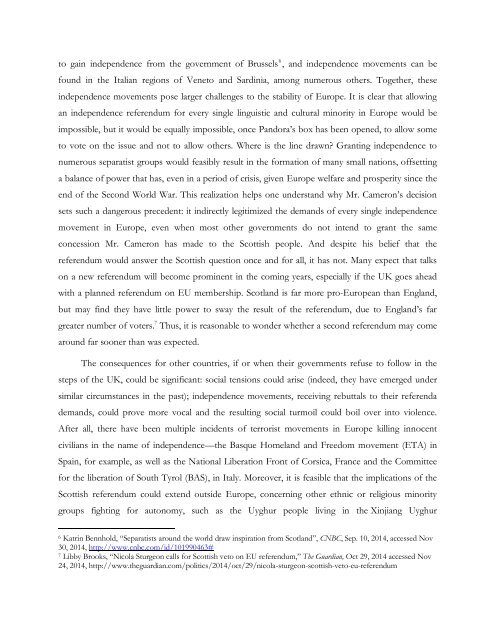Journal of Political Inquiry Fall 2014
Create successful ePaper yourself
Turn your PDF publications into a flip-book with our unique Google optimized e-Paper software.
to gain independence from the government <strong>of</strong> Brussels 6 , and independence movements can be<br />
found in the Italian regions <strong>of</strong> Veneto and Sardinia, among numerous others. Together, these<br />
independence movements pose larger challenges to the stability <strong>of</strong> Europe. It is clear that allowing<br />
an independence referendum for every single linguistic and cultural minority in Europe would be<br />
impossible, but it would be equally impossible, once Pandora’s box has been opened, to allow some<br />
to vote on the issue and not to allow others. Where is the line drawn Granting independence to<br />
numerous separatist groups would feasibly result in the formation <strong>of</strong> many small nations, <strong>of</strong>fsetting<br />
a balance <strong>of</strong> power that has, even in a period <strong>of</strong> crisis, given Europe welfare and prosperity since the<br />
end <strong>of</strong> the Second World War. This realization helps one understand why Mr. Cameron’s decision<br />
sets such a dangerous precedent: it indirectly legitimized the demands <strong>of</strong> every single independence<br />
movement in Europe, even when most other governments do not intend to grant the same<br />
concession Mr. Cameron has made to the Scottish people. And despite his belief that the<br />
referendum would answer the Scottish question once and for all, it has not. Many expect that talks<br />
on a new referendum will become prominent in the coming years, especially if the UK goes ahead<br />
with a planned referendum on EU membership. Scotland is far more pro-European than England,<br />
but may find they have little power to sway the result <strong>of</strong> the referendum, due to England’s far<br />
greater number <strong>of</strong> voters. 7 Thus, it is reasonable to wonder whether a second referendum may come<br />
around far sooner than was expected.<br />
The consequences for other countries, if or when their governments refuse to follow in the<br />
steps <strong>of</strong> the UK, could be significant: social tensions could arise (indeed, they have emerged under<br />
similar circumstances in the past); independence movements, receiving rebuttals to their referenda<br />
demands, could prove more vocal and the resulting social turmoil could boil over into violence.<br />
After all, there have been multiple incidents <strong>of</strong> terrorist movements in Europe killing innocent<br />
civilians in the name <strong>of</strong> independence—the Basque Homeland and Freedom movement (ETA) in<br />
Spain, for example, as well as the National Liberation Front <strong>of</strong> Corsica, France and the Committee<br />
for the liberation <strong>of</strong> South Tyrol (BAS), in Italy. Moreover, it is feasible that the implications <strong>of</strong> the<br />
Scottish referendum could extend outside Europe, concerning other ethnic or religious minority<br />
groups fighting for autonomy, such as the Uyghur people living in the Xinjiang Uyghur<br />
6 Katrin Bennhold, “Separatists around the world draw inspiration from Scotland”, CNBC, Sep. 10, <strong>2014</strong>, accessed Nov<br />
30, <strong>2014</strong>, http://www.cnbc.com/id/101990463#<br />
7 Libby Brooks, “Nicola Sturgeon calls for Scottish veto on EU referendum,” The Guardian, Oct 29, <strong>2014</strong> accessed Nov<br />
24, <strong>2014</strong>, http://www.theguardian.com/politics/<strong>2014</strong>/oct/29/nicola-sturgeon-scottish-veto-eu-referendum

















